
The Fargo Five is Uproxx’s weekly collection of thoughts, observations, and goofball screencaps from each new episode the FX limited series’ fourth season. We do not guarantee that there will be five items every week. There could be four, or six, or a dozen. Who knows? This show doesn’t follow the rules. We shouldn’t have to either.
NOTE: The fourth season debuted with back-to-back episodes, so this edition will be a doubleheader. Do not expect this many words every week. Thank you.
EPISODE 1 — “Welcome to the Alternate Economy” (or, “Doctor Senator Is Neither a Doctor nor a Senator”)
5a. The fourth season of Fargo opened with a 23-minute cold open, largely presented as a history report by narrator Ethelrida Smutny, a smart Kansas City high school student, whose parents — father a white man who continues Fargo’s proud tradition of feckless husbands; mother a Black woman who clearly runs the show — operate the local funeral home, called The King of Tears, because Fargo rarely lets you down in the “naming people or things” department. The narration and the action on-screen lay out the themes of the new season: immigration, race, what it means to be and become American. (“If America is a nation of immigrants then how does one become American.”) It does all of this through a very abbreviated history of fictionalized Kansas City organized crime, featuring child-swapping and double-crosses and the general principle that as groups assimilate into American culture, they are replaced by newer and hungrier groups who have yet to do the same.
The whole thing pulled off a trick that could have flummoxed a lesser show: It laid out the backstory and explained the themes that will dominate the season and introduced most of its main characters — the Smutnys; the Italian crime family, the Faddas; the Black crime family, led by Chris Rock’s Loy Cannon — while skipping along at a fun, quirky pace. It’s nice to have this show back. Noah Hawley is good at this. And huge chunks of the action were set to the instrumentals from “Caravan” by Juan Tizal and Duke Ellington, a song I had always referred to as “The Heist Song” before finally looking it up after this episode because I am an uncultured goon who sits around watching the Ocean’s movies all day.
5b. The most notable result of this child-swapping is the existence of a character named Rabbi Milligan (Ben Whishaw), an Irish-born mobster who was swapped twice as a child — once to the Hebrew gang, who he set up with a double-cross; once to the Italians, who he worked with to triple-cross the Irish father who swapped him twice. The result of it all is, yes, a man named Rabbi Milligan who is a part of the Italian mob. It’s somehow both a lot and exactly enough.
4. The action picks up in earnest with the death of crime boss Donatello Fadda, itself the result of a chain of events that made me so happy to have this show back, and which I will now introduce with this screencap.
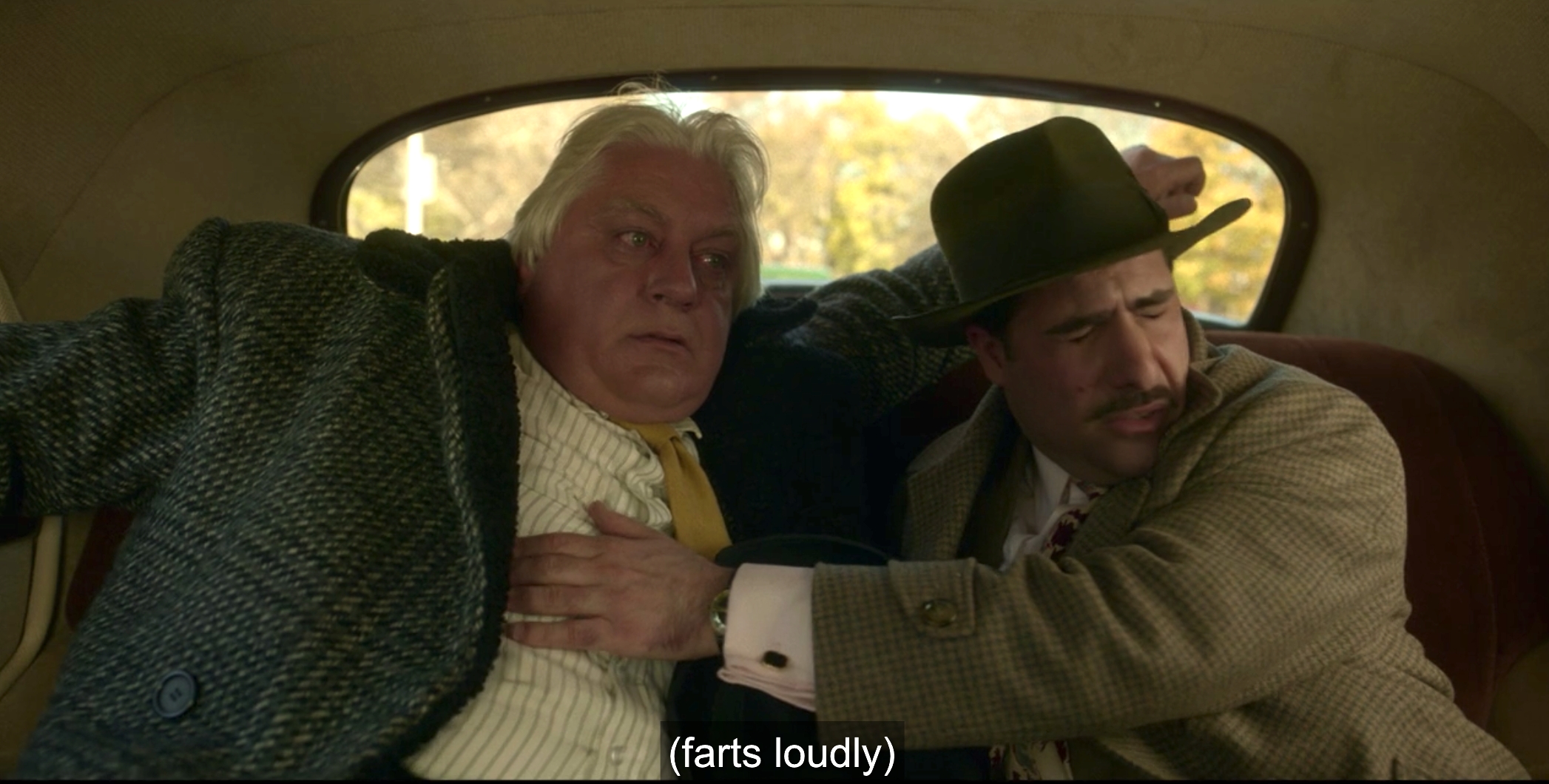
Let’s hit the bullet points for maximum efficiency:
- Two cars containing the Faddas were stopped at a school crossing as ominous music built and the action cut quickly from character to character and frantic bits of action, building tension in a classic crime movie way, implying something bad was about to happen
- Children were playing with toy guns and men were standing around reaching into their jackets and, again, it was all getting very stressful, and as this was going on, Fadda the Senior was starting to look ill, sweating and writhing and turning purple as though he was having trouble breathing
- Just when it looked like he might really be dying, we learned that the source of his discomfort was gas, and we learned this because he emitted a four-second Earth-rumbling fart that caused his oldest son, Josto (Jason Schwartzman), to open the window in a desperate attempt to breathe fresh air
- Seconds after this tension was revealed to be a long buildup to the best fart joke since Jeremy Irons in Watchmen, one of the children fired a pellet gun into the father’s neck by accident
This is what I’m talking about. Fargo delights in the okie-doke, the classic menacing setup turned left abruptly and transformed into the stupidest joke you’ve ever seen. It legitimately might be the hardest I’ve laughed in 2020. I’m okay with that.
3. The death of Fadda the Senior created a power vacuum, which Josto and Loy Cannon are both intent on filling. Josto is a blast, a seemingly incompetent and spoiled wannabe tough who is all smirks and posturing. Cannon is a combination of actual tough and smarts, who, with his Number Two, an economist named Doctor Senator who is neither a doctor nor a senator, is in the process of pitching what will become the modern credit industry to white banks in the area, to no avail. There are moments in this pitch that might feel a little too much like a wink at the camera to you (the banker saying their customers won’t want to spend money they don’t have and explaining that banks don’t engage in this kind of predatory behavior) (uh-huh, sure), and I was prepared to agree with that until I realized the snobby banker who was doing the winking at the camera was literally named “Wink.” There are layers here. It’s quite fun to peel them back.
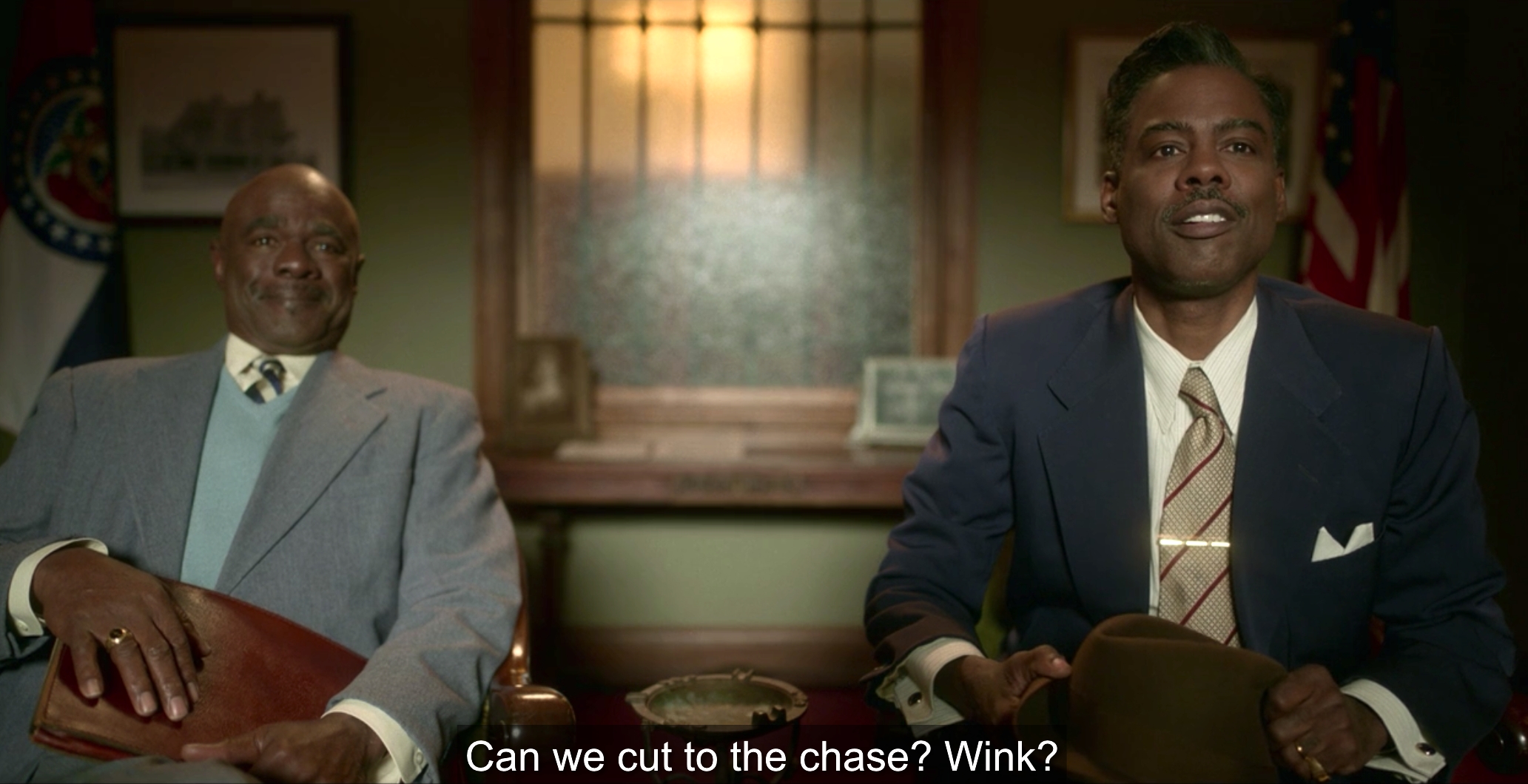
2. I’m sorry. I’m really very sorry. In my excitement to tell you about Wink the Winking Banker, it appears I skipped over at least two important things, which I will go back to bullet points to explain
- The pellet that landed in Fadda the Senior’s neck did not kill him right away, instead resulting in a rush to the nearest hospital, where they were denied access by a stuffy administrator named Dr. Harvard (YES), who tells them he doesn’t serve “their kind” and sends them to the public hospital
- His nurse as the public hospital, Oraetta Mayflower (Jessie Buckley), a Minnesota-nice woman who is fond of big words — she likes to be precise to avoid “instances of misreckoning” — and doing drugs with the children of her patients and, it appears, killing those patients with injections of unprescribed medicine before stealing their jewelry
Jessie Buckley appears to be having way too much fun with this, dropping her “donchaknows” in a Minnesota accent heavier than a Minnesota snowstorm. It’s a blast, and kind of scary, like the best parts of Fargo usually are.
1. Speaking of the best parts of Fargo, it says a lot about the show that a man named Doctor Senator does not have the best name of the season so far. Look at this collection of Cannon gang members that Cannon whistled to assemble early on. There’s a Mars Freeman, and an Opal Rackley, and a… wait a second.
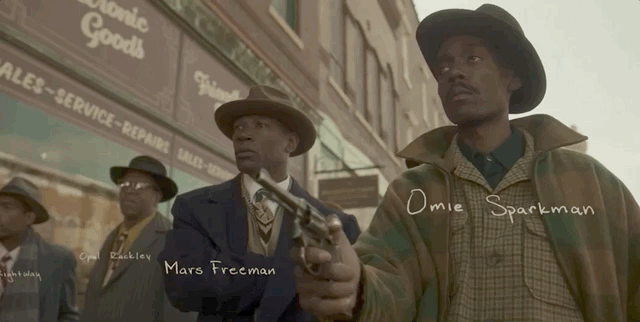
Computer… enhance. I think that said…
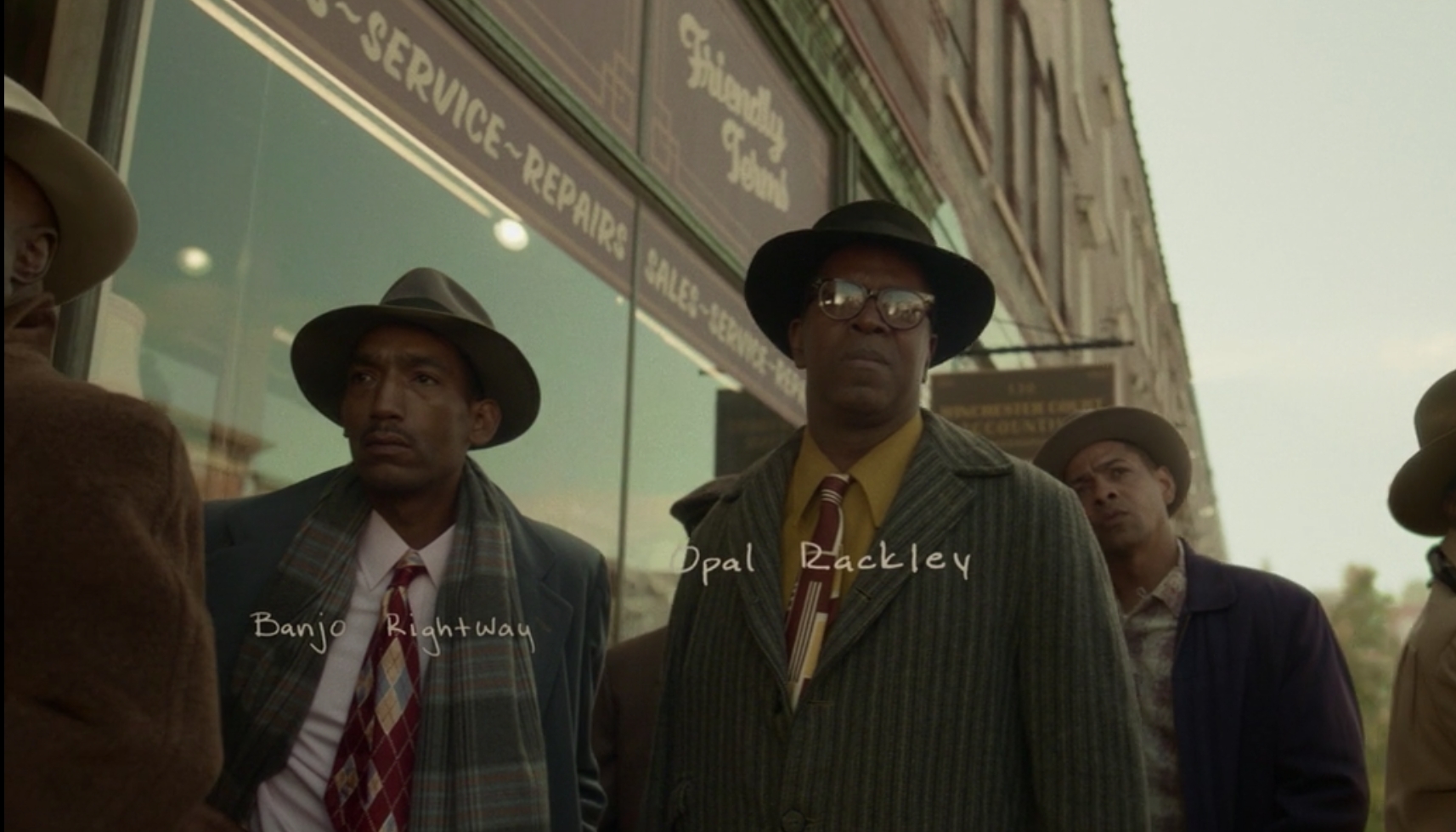
COMPUTER. ENHANCE.
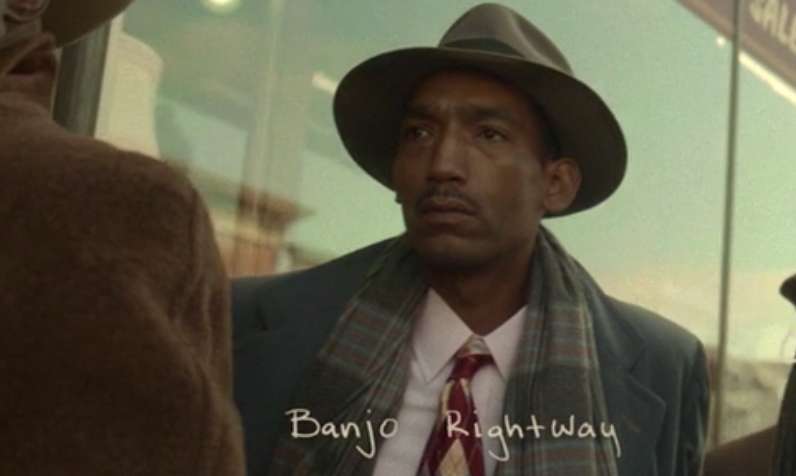
BANJO RIGHTWAY.
Welcome back, Fargo. I missed you very much.
EPISODE 2 — ” The Land of Taking and Killing” (or, “Enter Gaetano Fadda, My Menacing, Theatrical, Eye-Bulging Prince”)
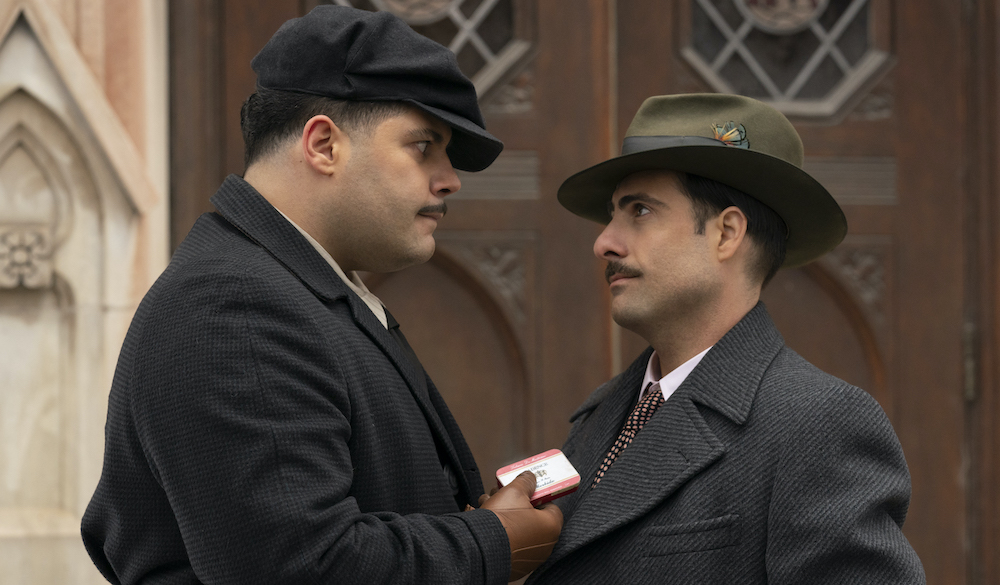
5. There is really quite a lot to get to from the second episode. There is murder and attempted murder and a jailbreak and a hostile takeover of a slaughterhouse. I promise I will get to all of that. But now, right now, in this moment, I must speak about Gaetano Fadda, Josto’s younger brother, back from Italy with Il Duce’s teeth in his pocket, with the energy of an ornery rhinoceros and the aggressive theatricality of a silent film star. He is doing so much — exaggerated movements, scrunching his face into various shapes and sizes, staring with such intensity at everyone and everything that it looks like his bulging eyes might shoot out of his head and into his adversaries — and I adore every part of it. He’s going to be a problem for everyone, starting with the older brother who he sees as weak and extending to the Cannon organization he intends to snuff out. This is all still in the very early going but I don’t think I’m out of line in any way when I tell you that Gaetano Fadda is my favorite character in this season and maybe my favorite character of this entire year. He’s like a cross between a Fargo villain and a Justified villain. This is very high praise, and very interesting when you consider Point Number One at the bottom of this page.
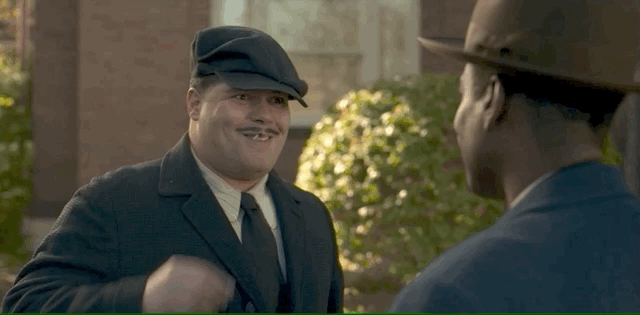
4. Gaetano Fadda was not the only new character introduced in this episode. We also met:
- Two fugitives, one the aunt of young Ethelrida and the other a foul-mouthed pistol-pulling Native American named Swanee Capps, who escape prison in the opening and show up at the Smutnys door in stolen clothes, with intentions of freeing the family from a debt to the Cannon organization and robbing banks to do so
- Odis Weff, a local lawman on the Fadda payroll who a) appears to be suffering from a very pronounced case of OCD, and b) is played by Jack Huston, who is back in a prestige period drama after starring in Boardwalk Empire, a show led by Steve Buscemi, who also appeared in the original film version of Fargo, which has nothing to do with anything beyond me just wanting to point out the connection
There is another new character we meet at the end of the episode. I’m teasing Point Number One again. I’m excited.
3a. The big piece of action in this episode was the Cannon organization making a move on the Fadda’s slaughterhouse, using the claim that Fadda the Senior promised it to them in a secret pre-death negotiation. There’s some great dialogue flowing all around this. Loy Cannon and Doctor Senator discussed the need for the move (or lack thereof) with comparisons to lions in the wild versus lions in cages versus lions mounted on a trophy hunter’s wall. Doctor Senator and my sweet boy Gaetano had a stand-off in which the latter breathed as loudly through his nose as Tony Soprano and announced, proudly, “In the land of taking and killing, Gaetano is king,” and the former retorts “Well be back. Because y’all just got here yesterday, but we’re part of this land, like the wind and the dirt.” It goes back to the themes introduced in Ethelrida’s opening from the first episode, about who is American in a nation of immigrants and how one transitions from one category to the other.
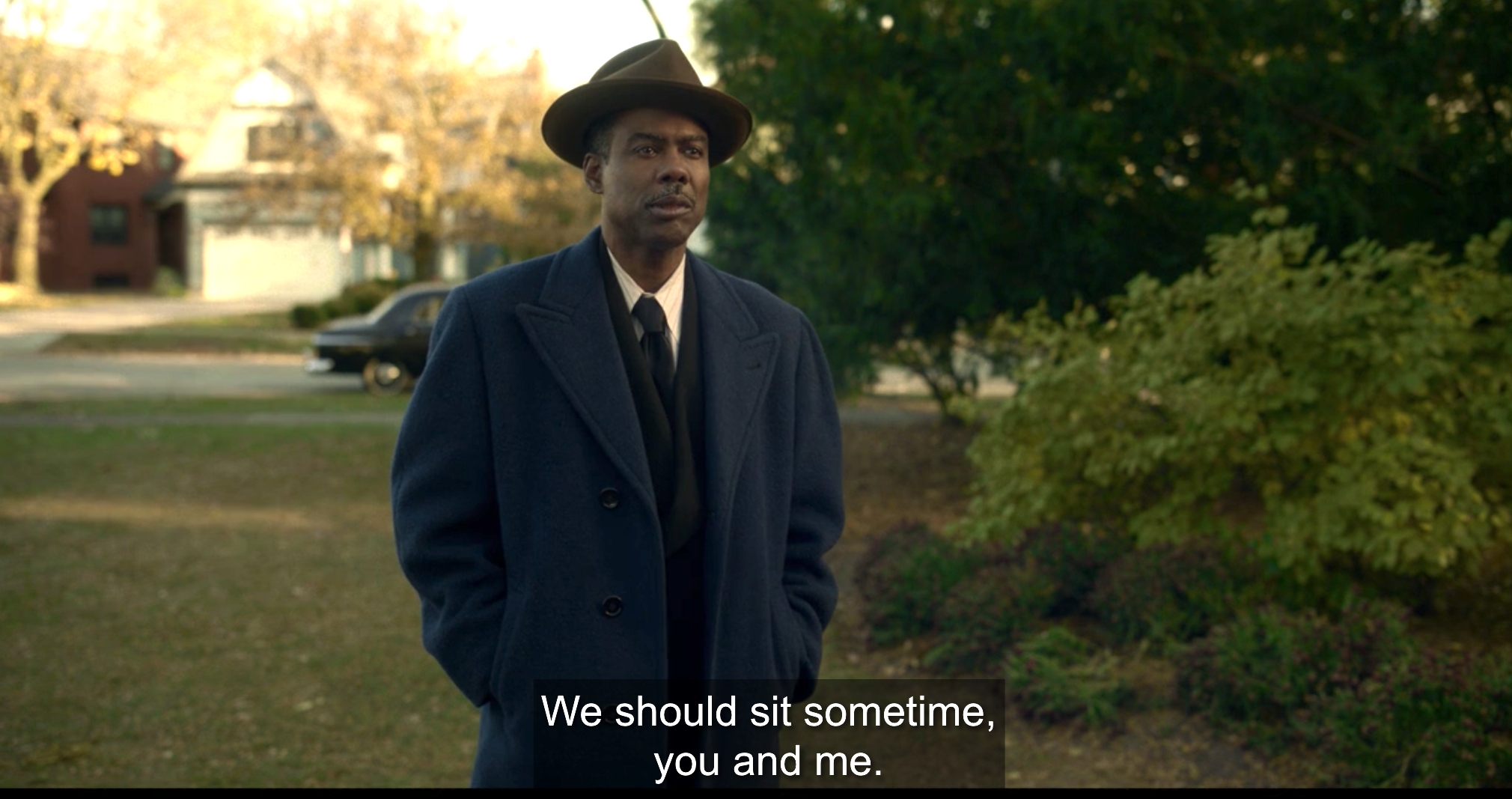
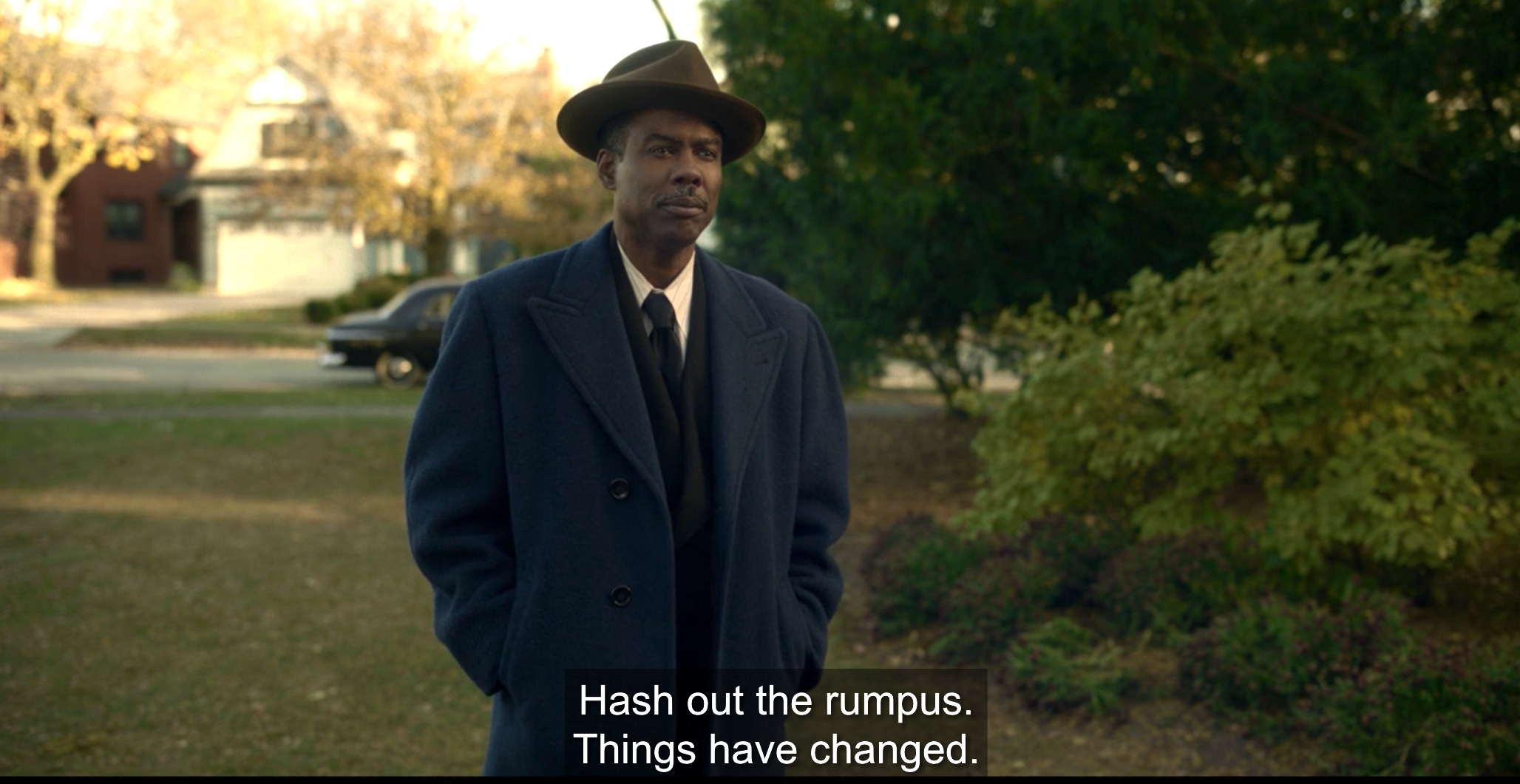
Also, in a somewhat related piece of business, before the slaughterhouse coup, Cannon went to the Fadda house for a brief swap-back of children (each family is raising the other’s youngest, as a way to encourage peace) and told Josto that they should sit down sometime to “hash out the rumpus” in the aftermath of Papa Fadda’s death. I wrote down this phrase when I saw the screener a few weeks ago and I have been itching to use it ever since. Turns out I don’t have many rumpuses in need of hashing out. This has been devastating. Someone, please, come to me with a rumpus to hash out. I must hash out a rumpus. I had no idea I needed this until a couple weeks ago and now it’s the only thing in the world that I want. Let me be a rumpus hasher. I’ll hash out all the rumpuses.
3b. On the subject of beautiful turns of phrase, Josto was accosted by his pushy politician future father-in-law at his own father’s funeral and responded by telling the mayor-dreaming man to “go fuck a state park,” which is as confusing as it is enjoyable. I do not even know how one begins to do that. I am kind of fascinated by it, though. Is… is a geyser involved? No. No. I don’t want to know. I want to let this mystery be.
2a. The most consequential mob-related event of the episode that did not involve a slaughterhouse takeover was probably the attempted murder of Dr. Harvard. Josto called for the hit, which failed and resulted only in the death of the wealthy woman the doctor was attempting to pump for money. Josto is furious about all of it for many reasons (revenge, embarrassment, etc.) and Gaetano’s eyes bulged even more as they discussed it, which I didn’t know was possible. This will be a thing.
2b. The most consequential event of the episode that didn’t involve any of that was Oraetta getting fired from her job in the act of trying to kill another patient, which she somehow spun into two months of severance and a glowing written recommendation through a string of verbal loop-de-doos aimed at a hapless administrator, including, at one point, the phrase “I thought this was America.” It was a great bit of monologuing on a show filled with monologues. And the direct result of her getting fired appeared to be her having more time on her hands to work on her “special projects,” which for now includes getting close to fellow Sagittarius Ethelrida through offers of cleaning work and French music and also involves delivering pies laced with stomach-churning chemicals. Oraetta terrifies me. There’s something about a tiny evil person who smiles all the time that is even scarier than a huge rage-filled monster like Gaetano. It’s why I would turn and flee as fast as I could if I ever saw Christoph Waltz on the street. Can’t be too careful.
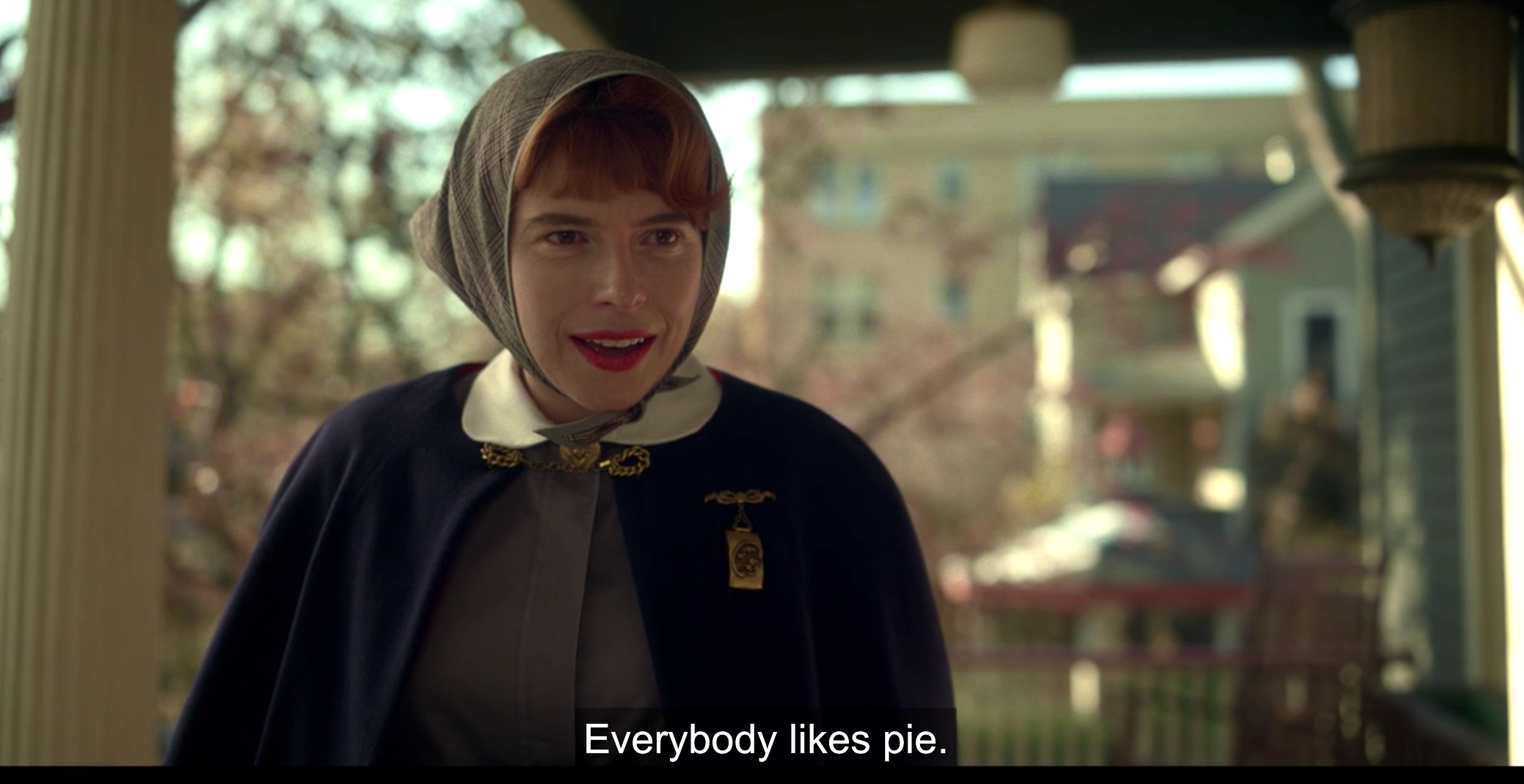
1. The episode closed with Oraetta leaving the pie on the Smutneys doorstep and a long slow camera movement toward a car parked in the dark on the street, raising the all-important question of “Who is in that car?” Well, ladies and gentlemen, it brings me great pleasure to report that the car contained a group of lawmen led by a Stetson-clad Timothy Olyphant — yes, I shouted “RAYLAN” when I saw this; yes, I miss Justified — who proceeded to kick in the Smutney’s door as the screen cut to black and the credits started rolling.
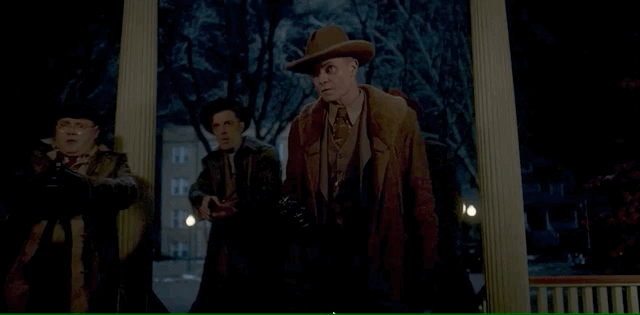
This is how you do a cliffhanger. All shows should do cliffhangers like this. Like, specifically like this, with a Stetson-clad Timothy Olyphant kicking in a door. Even This Is Us. It couldn’t hurt.
